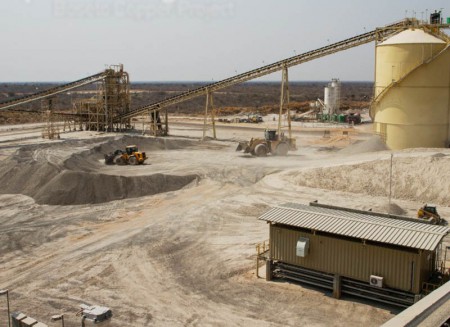Disasters conspire against Ngamiland
Boniface Keakabetse | Friday March 20, 2015 12:42


For a long time now, these villages have witnessed disaster after disaster, sometimes man-made and other times natural.
In recent weeks and months, the disasters have seemed to want to outdo each other.
For the record, the Lake Ngami area is supposed to be the land of plenty, boasting a healthy cattle population, thriving fishing industry and booming copper resources.
Recently, just as residents were savouring the good news that a new mining company, Khoemacau, was planning to start mining in the area, out of the blue they were stunned by news of a fresh Foot and Mouth Disease (FMD) outbreak.
At the last count, at least 59 beasts have been found with the crippling disease at three crushes in the area.
The latest outbreak was received with a sense of déjà vu by residents who went through the same ordeal in 2007 when they could not sell their beasts to the Botswana Meat Commission (BMC) leading to their descent further into the pit of poverty.
The latest outbreak came hot on the heels of a fishing ban imposed by government on Lake Ngami, that has affected the lives of thousands of fishermen who were dependent on the lake.
As unthinkable as the ban was however, it was met with deafening applause from the cattle farming community who had long been complaining that the fishermen were polluting the Lake and the surroundings on which their cattle were dependent.
Kgosi Kanji Kanji of Sehitwa recently told Mmegi that his community feared an outbreak of measles within their cattle due to rampant open defecation and associated pollution committed by fishermen.
Kanji further said the fishing sector was also not entirely benefitting the communities around Lake Ngami.
Even as the debate around the fishing ban continued – with fishermen threatening to sue government – a fresh threat arose when Boseto Mine, which is located near Lake Ngami, closed down, throwing more than 800 jobs into the wind.
The first ever mine in Ngamiland, Boseto had brought with it expectations of employment and better livelihoods for residents of the three villages, the entire district and even the whole country.
Boseto had brought previously unknown interest particularly to Toteng, which is closest to the mine site. Overnight, the village witnessed a population boom with the Land Board reporting soaring numbers of applications for residential and business plots.
Sehitwa also saw increases in the numbers of people applying for plots. The high expectations with which residents of the BOSETO villages greeted the new mine, have now warped into anguish.
“When it was announced the mine was opening, we thought our village would end up like Jwaneng or Selebi Phikwe. We thought there would be malls and more development projects coming our way but it was never to be,” says Toteng villager, Thabo Simasuku.
In the wake of the mine’s closure and with minds now sober from the heady days of its initial commissioning, villagers are now beginning to see the negative flip side of the development.
Toteng Village Development Committee chairman, Israel Tjiharuka says the mining pits around the area are virtually graveyards for cattle.
“This is a cattle rearing area but the coming of the mine brought many problems as cattle fell and died in the mine pits. A lot of farmers have lost their cattle which fell into the mine pits while some were hit by dump trucks from the mine.
“The mine workers seemed not to care about our cattle. I think more than 100 cattle were lost since the mine opened.”
He says even as the mine closed, its owners did nothing to secure the treacherous pits.
“The fence around the pits is not strong. We are concerned about the fate of our cattle,” he says.
According to Tjiharuka, many people also lost a lot of money building houses they expected to rent to the miners but this was never to be. He reveals that the mine owners had promised villagers a township in the area and had encouraged them to build houses that would be rented to mineworkers.
“Some residents seized the opportunity and took loans to build houses but found themselves in the lurch.
”We are not going to miss DML. The company did almost nothing to lift the living standards of our people since it started operating. Let them go.”
Toteng villager, Petrus Mbaeva also feels the recently closed mine did nothing for their area.
“We expected the mine would boost local businesses struggling with market access by procuring from them, but they did not do so.
“Residents of Toteng and the other villages in the vicinity of the mine reared cattle but the mine did not buy from them.
”They got all their products and services from outside not from us as we had expected,” he says.
Villagers had hoped Boseto would kickstart the struggling cattle industry in the area, which nosedived after the FMD outbreak of 2007.
With the mine shut for now and a new FMD outbreak rearing its ugly head, BOSETO villagers bemoan the fact that they do not have fishing activities to turn to for income.
An even bigger blow, however, is the loss of a lucrative Thailand beef export deal from which Ngamiland farmers would have reaped millions of Pula. The deal has almost certainly fallen through due to the FMD outbreak.
“There is huge demand for beef from this area. Thailand is a ripe market which does not have much stiff requirements,” BMC Maun abattoir manager, Mothobi Mothobi says. “If we had accessed the Thailand market, we would have increased cattle prices for the benefit of farmers. “Now we have this. FMD is a huge problem.” A huge problem, particularly when partnered with similar challenges in fishing and mining.
